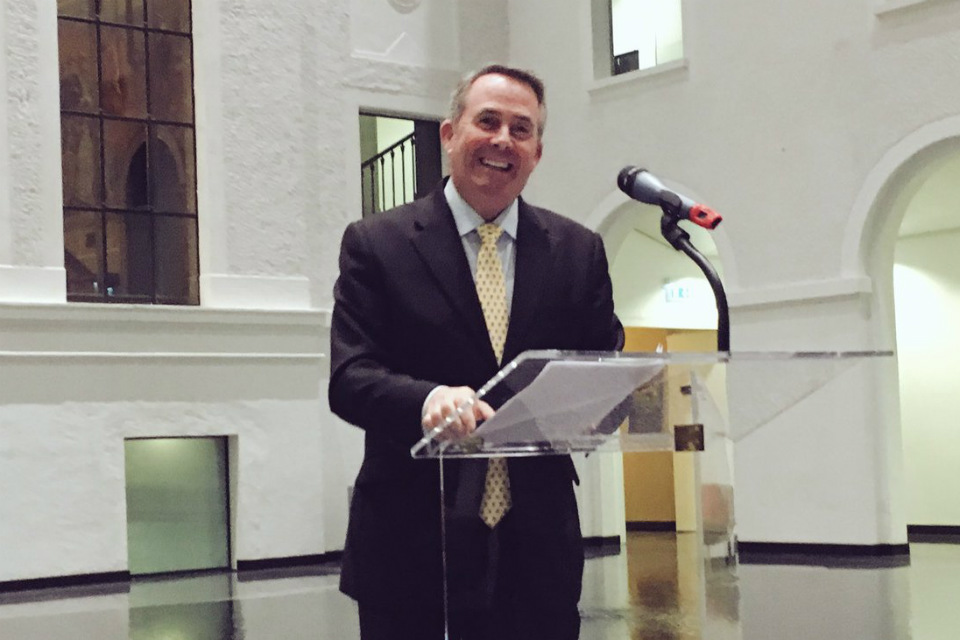Liam Fox's speech to the World Trade Organization
Speech delivered by International Trade Secretary Liam Fox to trade envoys at the World Trade Organization in Geneva on 1 December.

As the United Kingdom prepares to trigger Article 50 and begins the process of leaving the European Union, we in Britain must decide what kind of country we now want to live in.
It offers us an opportunity to forge a new role for ourselves in the world.
There are some who have suggested that June’s vote was a sign of insularity, that the voters of the UK had rejected the era of globalisation and decided to pull up the drawbridge, beginning a period of national introspection.
Nothing could be further from the truth.
The UK may have voted to leave the European Union, but we are not withdrawing from the world.
International trade is the lifeblood of the British economy, the driver of our prosperity. Commerce is part of our national DNA.
Inside the EU, the UK is one of the Union’s strongest advocates for free trade, unwavering in our support for the Union’s trade agreements.
Outside the EU, we will continue to champion this cause.
Britain will be one of the strongest voices worldwide for free and open trade.
In recent years, the global economy has once again faced the threat of protectionism, a symptom of more testing economic times.
The WTO has been unafraid to voice its concern that within the G7 and G20 economies, protectionist barriers have begun to creep up.
The WTO’s own data shows that obstacles to trade are, for the first time in decades, growing faster than they can be removed.
The UK will work towards the reduction and ultimate elimination of trade barriers wherever they are found, countering the threat of protectionism for the benefit of the global economy. We know that trade is a moral mission, its benefits measured in human, as well as economic terms.
Trade is the greatest emancipator of the world’s poor, yet without these freedoms from damaging barriers and protectionist behaviour, it cannot raise them from poverty.
Unless we remove damaging restrictions, trade cannot act as a great social leveller, allowing people across the world to buy the best goods at the lowest price.
And it cannot spread political freedoms to those societies that need them the most.
For Britain, there is no greater platform for this mission than the WTO.
The UK was a founding member of the Organization, a fact of which we are immensely proud.
From its inception in 1947 as the General Agreement on Tariffs and Trade, to its full establishment at the end of the Uruguay round in 1994, Britain has pushed for the Organization’s creation, and championed trade liberalisation from within.
The multilateral trading system of the WTO is the apogee of free trade; 164 countries working together towards a world free from tariffs and barriers.
As the UK leaves the EU we must ensure that our watchwords are continuity and consistency, and every effort will be made to minimise disruption to the trading relationships that have served us and our partners so well, ensuring that our free and open commercial relationships continue to drive our mutual prosperity.
We pledge to work closely and cooperatively with the EU and all our WTO partners to ensure a smooth transition.
The era of globalisation is also one of economic co-operation.
The UK has, for example, long been supportive of further trade liberalisation, including in services. We hope that all free trade negotiations currently in motion – but stalled - will resume soon and we look forward to a positive outcome.
Britain is open for business as never before. It is our ambition to be the beating heart of global trade; the world’s natural business partner.
Article 50 has yet to be triggered, and the formal process of leaving the European Union has yet to begin.
In the meantime, there is certainly important work to be done here at the WTO.
Our task now is to agree the post-Nairobi agenda, ensuring that, at the next ministerial in Buenos Aires, we can make real multilateral progress.
Of course, caution is required. Progress must be incremental, and its aims achievable. Yet we cannot give up on this multilateral approach.
Co-operation must always be our mantra.
Our current aims are a fine example of how the UK will continue to work, for now, under the auspices of the EU, and in future alongside our European partners.
We will continue to prioritise key issues, focussing on agricultural support and digital trade and investment.
Our aim is to work with all our partners, staying in step with our EU neighbours and realise our shared goals.
Members have a big opportunity this weekend to make real progress towards concluding the plurilateral Environmental Goods Agreement.
Britain stands ready to take a leading role within the WTO.
We have the diplomatic experience and economic gravity to be a considerable ally to those countries who share our values on free trade, and our vision for the global economy.
Director General Azevedo has already offered his support and that of the WTO Secretariat as we consider our transition to becoming an independent member. Britain is very grateful for that support.
We must never forget the good work that is done here at the WTO.
This organisation is one of the cornerstones of the global economy, a convening of free traders that can offer tangible results for the benefit of all our people.
The deals signed here have lifted millions from poverty, and created a world that few of those who signed GATT in 1947 would thought possible.
Though there will be challenges ahead, the prize will certainly be worth any setback.
The UK, within the WTO, will be at the forefront of building this new world.
We have so much to offer together in building a stable, secure and prosperous future.